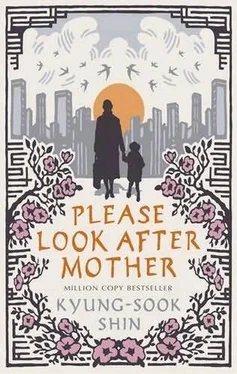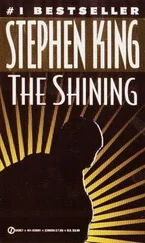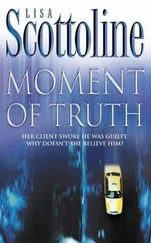“What is this?”
“Last New Year’s Eve, I wrote down what I wanted to do with my life, other than writing. Just for fun. The things I wanted to do in the next ten years. But I didn’t plan on doing anything with Mom. I didn’t realize that while I was writing it. But now, when I look at it after Mom’s gone missing…”
He is drunk. He gets off the elevator and presses the doorbell. No response. He takes his keys out of his pocket and, weaving about, unlocks the door. After he parted with his sister, he went to two more bars. Whenever the image of the woman wearing blue plastic sandals, the woman who could be Mom, the woman who had walked so much that the sandals dug deep into her foot, practically revealing the bones, danced in front of his eyes, he downed another drink.
The light is on in the living room, which is quiet. The statue of Mary that Mom brought watches him. Stumbling, he heads for his bedroom, but pauses to quietly push open the door to his daughter’s room, where Father is staying. He can see Father sleeping on his side, on a mat on the floor next to his daughter’s bed. He goes inside and pulls up the blanket his father had pushed off in his sleep, and comes back out, gently closing the door behind him. In the kitchen, he pours himself a glass of water from the carafe on the table, and looks around him as he drinks it. Nothing has changed. The hum of the refrigerator is the same, and so is the sink piled with dishes his wife has left undone; she always puts off doing the dishes. He hangs his head, then ventures into his room and looks down at his sleeping wife. A necklace glints at her throat. He grabs the blankets covering her and yanks them off. She sits up, rubbing her eyes.
“When did you get home?” She sighs at his roughness, which contains a silent scolding: How can you sleep! Ever since Mom disappeared, he has started to take things out on everyone. He gets angrier when he comes home. When his brother called to see how the search was going, he answered a few questions but then erupted, “Don’t you have anything to tell me? What the hell are you doing?” When Father announced that he would return home because there was nothing he could do here in Seoul, he yelled, “And what are you going to do in the country?” In the morning, Hyong-chol would leave without glancing at the breakfast his wife made him.
“Have you been drinking?” His wife wrests the blankets from his grip and straightens them.
“How can you sleep?” He says it out loud now.
His wife smooths her nightgown.
“I said, how can you sleep!”
“What am I supposed to do, then?” his wife yells back.
“It’s your fault!” His voice is slurred. Even he knows that this is a stretch.
“Why is it my fault?”
“You should have gone to meet them!”
“I told you I was going to bring food to Chin.”
“Why did you have to go right then? My parents were coming up from the country so we could celebrate their birthdays!”
“Father said he could find his way! And we’re not the only family in the city. And they wanted to go to your brother’s that day. And your sisters are here, too. Your parents don’t always have to stay at our place, and there’s no rule that I have to be the one to go meet them! I hadn’t gone to see Chin in two weeks, and she had nothing to eat, so how could I not go see her? I’m tired, too, going to take care of Chin and everything. And she’s studying for her exam-do you even know how important this test is to her?”
“How long are you going to go on bringing food to a grown child, who doesn’t even stop by when her grandmother is missing?”
“What would she do if she came? I told her not to come. We searched everywhere. What can we do when even the police can’t find her? Do we go from door to door and ring the bells and ask, Is our mother here? What can Chin do when even the adults can’t do anything? A student has to go to school. Do we all just stop doing what we do because Mother isn’t here?”
“She’s missing, not ‘isn’t here.’ ”
“So what do you want me to do? You yourself go to work!”
“What?” He picks up a golf club from a corner and is about to hurl it across the room.
“Hyong-chol!” Father is standing at the open door. Hyong-chol puts down the golf club. Father had come to Seoul for his birthday to make it more convenient for his children. If they’d celebrated his birthday, as planned, Mom would have said, “This is celebrating my birthday, too,” sitting at the table in the traditional full-course Korean restaurant where his wife, weeks before, had made a reservation. But with Mom missing, Father’s birthday went by without any celebration, and Aunt took charge of the summer ancestral rites.
He follows Father out.
“It’s all my fault,” Father says, turning around at his granddaughter’s bedroom door.
Hyong-chol is silent.
“Don’t fight. I know what you’re feeling. But fighting doesn’t help anything. Your mom met me and had a hard life. But she is a kind person. So I’m sure she’s at least alive. And if she’s alive, we’ll hear something.”
Hyong-chol stays silent.
“I want to go home now.” Father stares at him for a while, then enters the room. Looking at the closed door, Hyong-chol bites his lip, and heat flares in his chest. He rubs his chest with his hands. He’s about to rub his face with his hands, as is his habit, but stops. He can feel Mom’s gentle touch. Mom hated it when he rubbed his hands or slouched. If he did that in front of her, she immediately straightened his hands and shoulders. If he was about to duck his head, Mom slapped him on the back, telling him, “A man has to be dignified.” He never became a prosecutor. Mom always called it his dream, but he hadn’t understood that it had been Mom’s dream, too. He only thought of it as a youthful wish that couldn’t be achieved; it never occurred to him that he had deflated Mom’s aspirations as well. He realizes that Mom has lived her entire life believing that she was the one who held him back from his dream. I’m sorry, Mom, I didn’t keep my promise . His heart brims with the desire to do nothing but look after Mom when she’s found. But he has already lost that chance.
He crumples to his knees on the living-room floor.

A YOUNG WOMAN is peeking in, standing in front of the firmly closed blue gate.
“Who are you?” When you clear your throat from behind her, the young woman turns around. She has a smooth forehead and hair tied neatly back, and her eyes shine in delight.
“Hello!” she says.
You just stare at her, and she smiles. “This is Auntie Park So-nyo’s house, right?”
The nameplate of the long-empty house has only your name engraved on it. “Auntie Park So-nyo”-it’s been a long time since you heard someone call your wife Auntie, not Grandma.
“What is it?”
“Isn’t she home?”
You are quiet.
“Is she really missing?”
You gaze at the young woman. “Who are you?”
“Oh, I’m Hong Tae-hee, from Hope House in Namsan-dong.”
Hong Tae-hee? Hope House?
“It’s an orphanage. I was worried because she hadn’t stopped by in so long, and I came across this.” The woman shows you the newspaper ad your son created. “I’ve come by a couple of times, wondering what happened, but the gate was always locked. I thought I would have to go away empty-handed today, too… I just wanted to hear what happened. I was supposed to read her a book…”
You pick up the rock in front of the gate, take the key out from its hiding place, and unlock the gate. Pushing open the gate of the long-vacant house, you look in, hopeful. But it’s silent inside.
Читать дальше












